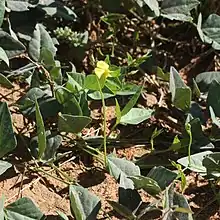Vigna lanceolata
Vigna lanceolata, known as the pencil yam, native bean,[1] Maloga bean,[1][2] parsnip bean,[1][2] Ngarlajiyi,[3] small yam,[3] yam,[1] bush carrot,[3] Wapurtali,[3] Wapirti,[3] and Wajaraki[3] is an Australian native plant. Its name in the Arrernte language of Central Australia is Merne arlatyeye.
| Vigna lanceolata | |
|---|---|
 | |
| Scientific classification | |
| Kingdom: | Plantae |
| Clade: | Tracheophytes |
| Clade: | Angiosperms |
| Clade: | Eudicots |
| Clade: | Rosids |
| Order: | Fabales |
| Family: | Fabaceae |
| Subfamily: | Faboideae |
| Genus: | Vigna |
| Species: | V. lanceolata |
| Binomial name | |
| Vigna lanceolata Benth.[1] | |
Bush carrot is an important bush tucker food for Aborigines, and there are many Dreaming rituals around it. It is still commonly eaten in the desert today. It is a slender twining plant with yellow pea flowers throughout the year.
Aboriginal people from the desert dig them up in creekbeds. They look for the white roots, then cook them in the hot earth beside the fire until they are just firm.
Esteemed artist Emily Kngwarreye had an individual Dreaming around the pencil yam. This meant she had been given stories about the origins of the pencil yam, and was entitled to tell these stories and paint the yam.
References
- "Vigna lanceolata". Australian Plant Name Index (APNI), IBIS database. Centre for Plant Biodiversity Research, Australian Government, Canberra. Retrieved 3 July 2012.
- "Vigna lanceolata". Germplasm Resources Information Network. Agricultural Research Service, United States Department of Agriculture. Retrieved 21 January 2018.
- West, M.; Mackinolty, C.; Pedersen, B.A.; Napurrurla, Y.L.F.; Nicholls, C. (2011). Yulyurlu: Lorna Fencer Napurrurla. Wakefield Press. ISBN 9781743050095.